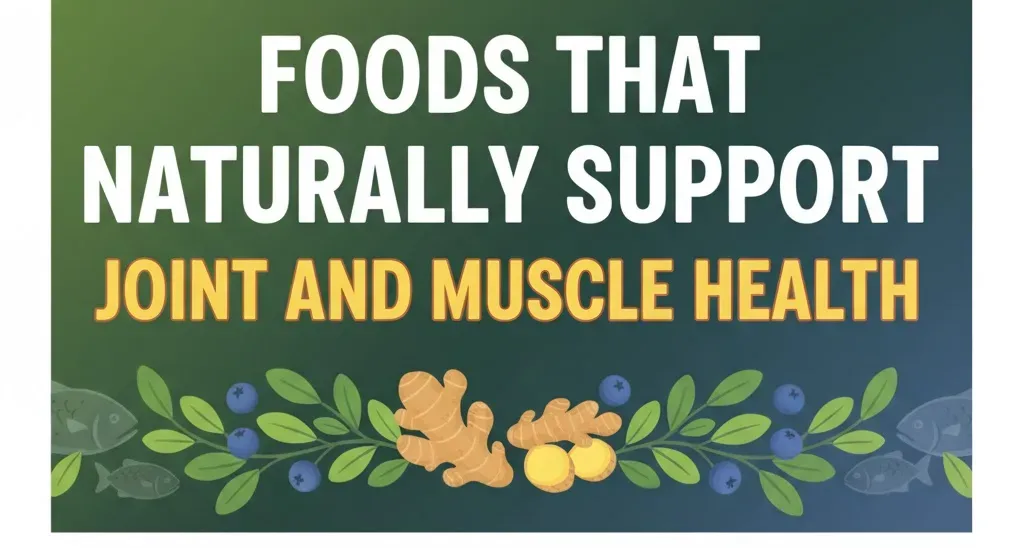Joints and muscles work together to keep your body strong and mobile. Over time, age, inactivity, or poor diet can cause stiffness, pain, or weakness. The right foods help maintain flexibility, rebuild tissues, and reduce inflammation naturally. Choosing nutrient-rich foods strengthens bones, supports collagen formation, and keeps muscles performing at their best. A consistent diet filled with vitamins, minerals, healthy fats, and proteins can prevent discomfort and keep your body resilient. Here are 20 foods that naturally support joint and muscle health.
Foods That Naturally Support Joint and Muscle Health
1. Salmon
Salmon is loaded with omega-3 fatty acids that reduce joint inflammation and stiffness. It improves circulation and promotes recovery after exercise, making it one of the best foods for maintaining flexibility.
2. Spinach
Spinach provides calcium, magnesium, and antioxidants that strengthen bones and protect muscle tissues. Its anti-inflammatory properties make it excellent for reducing soreness and improving endurance.
3. Blueberries
Blueberries are packed with antioxidants that combat free radicals and prevent muscle fatigue. Their natural compounds also support collagen repair for healthier cartilage and joints.
4. Almonds
Almonds offer healthy fats, vitamin E, and protein. These nutrients protect tissues from oxidative damage and assist in muscle recovery after physical activity.
5. Turmeric
Turmeric contains curcumin, a compound that fights inflammation and reduces joint stiffness. Adding it to your meals helps soothe discomfort and supports long-term flexibility.
Essential Nutrients for Joint and Muscle Strength
| Nutrient | Function | Food Sources |
|---|---|---|
| Omega-3 Fatty Acids | Reduce inflammation | Salmon, Flaxseeds |
| Vitamin C | Builds collagen | Citrus, Berries |
| Calcium | Strengthens bones | Spinach, Milk |
| Protein | Repairs muscles | Eggs, Lentils |
| Vitamin E | Protects tissues | Almonds, Avocado |
6. Eggs
Eggs provide complete protein and essential amino acids needed for muscle repair. The yolk also contains vitamin D, which supports calcium absorption and bone strength.
7. Bone Broth
Bone broth supplies collagen and amino acids that maintain cartilage and joint elasticity. A cup daily supports flexibility and reduces stiffness.
8. Oranges
Rich in vitamin C, oranges promote collagen production and reduce inflammation around joints. Their antioxidants help muscles recover faster.
9. Lentils
Lentils deliver plant-based protein, magnesium, and zinc—all vital for muscle repair and bone health. They also help control inflammation and provide lasting energy.
10. Olive Oil
Olive oil is rich in monounsaturated fats and antioxidants that lubricate joints and prevent stiffness. It’s an ideal replacement for refined oils.
11. Ginger
Ginger contains gingerol, which reduces pain and swelling in joints and muscles. It enhances blood flow, promoting faster healing and better flexibility.
12. Garlic
Garlic has sulfur compounds that aid collagen formation and strengthen tissues. It also helps prevent cartilage damage caused by inflammation.
13. Avocado
Avocados are filled with healthy fats, potassium, and vitamin E that support muscle strength and reduce joint discomfort. They also help maintain healthy body weight, reducing strain on joints.
14. Quinoa
Quinoa provides a balanced protein profile and essential minerals like magnesium and phosphorus. It supports muscle growth and reduces fatigue during physical activity.
15. Green Tea
Green tea’s polyphenols protect cartilage and reduce inflammation in tissues. Drinking it regularly improves recovery and overall joint health.
Anti-Inflammatory Foods and Benefits
| Food | Active Compound | Key Benefit |
|---|---|---|
| Turmeric | Curcumin | Reduces stiffness and swelling |
| Ginger | Gingerol | Relieves muscle and joint pain |
| Olive Oil | Oleocanthal | Acts as a natural anti-inflammatory |
| Green Tea | Polyphenols | Protects cartilage from damage |
| Blueberries | Anthocyanins | Improve recovery and reduce soreness |
16. Yogurt
Yogurt provides protein, calcium, and probiotics that support bone density and reduce inflammation. It also enhances nutrient absorption for better recovery.
17. Sweet Potatoes
Sweet potatoes offer potassium, vitamin C, and beta-carotene, all of which support muscle function and reduce oxidative stress. They also help maintain electrolyte balance.
18. Tomatoes
Tomatoes contain lycopene, an antioxidant that protects joints from oxidative damage and supports tissue repair. Cooking tomatoes enhances lycopene absorption.
19. Cherries
Tart cherries are rich in compounds that reduce post-exercise soreness. They help muscles recover faster and lower inflammation in joints.
20. Water
Water plays a vital role in joint lubrication and muscle elasticity. Staying hydrated prevents cramps and maintains smooth, pain-free movement.
Sample Daily Diet for Joint and Muscle Support
| Meal | Foods | Key Benefit |
|---|---|---|
| Breakfast | Eggs, Blueberries, Green Tea | Energy and antioxidants |
| Lunch | Salmon, Spinach Salad, Olive Oil | Omega-3 and minerals |
| Snack | Almonds, Cherries | Reduces inflammation |
| Dinner | Lentil Soup, Sweet Potato | Tissue repair and strength |
Additional Tips for Better Joint and Muscle Health
-
Eat balanced meals with enough protein and healthy fats.
-
Avoid processed and sugary foods that increase inflammation.
-
Include anti-inflammatory spices like turmeric and ginger daily.
-
Stretch and move regularly to keep joints flexible.
-
Stay hydrated throughout the day.
-
Get enough sleep to allow muscles and tissues to recover.
FAQs
1. Which foods improve joint flexibility?
Fatty fish and olive oil help reduce stiffness and keep joints flexible.
2. How does collagen help joint health?
Collagen maintains cartilage strength and prevents joint wear.
3. Are fruits useful for muscle recovery?
Yes, berries and citrus fruits reduce soreness and promote faster recovery.
4. Can I support joint health with a vegetarian diet?
Yes, lentils, spinach, quinoa, and nuts provide essential nutrients for joint strength.
5. Why is hydration important for joints?
Water keeps joints lubricated and helps muscles stay elastic.
6. What daily foods prevent inflammation?
Turmeric, ginger, olive oil, and cherries naturally reduce inflammation.
Conclusion
Healthy joints and muscles depend on consistent nutrition and lifestyle habits. Foods rich in omega-3s, antioxidants, vitamins, and minerals help reduce pain, improve flexibility, and strengthen tissues. Whether from fish, vegetables, nuts, or whole grains, each nutrient supports long-term mobility. Combined with regular exercise, hydration, and proper rest, these foods naturally maintain joint and muscle health for an active, pain-free life.








